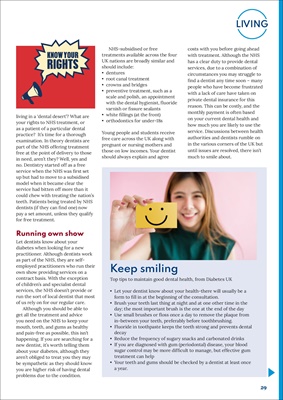
29
LIVING
living in a 'dental desert'? What are
your rights to NHS treatment, or
as a patient of a particular dental
practice? It's time for a thorough
examination. In theory dentists are
part of the NHS offering treatment
free at the point of delivery to those
in need, aren't they? Well, yes and
no. Dentistry started off as a free
service when the NHS was first set
up but had to move to a subsidised
model when it became clear the
service had bitten off more than it
could chew with treating the nation's
teeth. Patients being treated by NHS
dentists (if they can find one) now
pay a set amount, unless they qualify
for free treatment.
Running own show
Let dentists know about your
diabetes when looking for a new
practitioner. Although dentists work
as part of the NHS, they are selfemployed
practitioners who run their
own show providing services on a
contract basis. With the exception
of children's and specialist dental
services, the NHS doesn't provide or
run the sort of local dentist that most
of us rely on for our regular care.
Although you should be able to
get all the treatment and advice
you need on the NHS to keep your
mouth, teeth, and gums as healthy
and pain-free as possible, this isn't
happening. If you are searching for a
new dentist, it's worth telling them
about your diabetes, although they
aren't obliged to treat you they may
be sympathetic as they should know
you are higher risk of having dental
problems due to the condition.
NHS-subsidised or free
treatments available across the four
UK nations are broadly similar and
should include:
• dentures
• root canal treatment
• crowns and bridges
• preventive treatment, such as a
scale and polish, an appointment
with the dental hygienist, fluoride
varnish or fissure sealants
• white fillings (at the front)
• orthodontics for under-18s
Young people and students receive
free care across the UK along with
pregnant or nursing mothers and
those on low incomes. Your dentist
should always explain and agree
Keep smiling
Top tips to maintain good dental health, from Diabetes UK
• Let your dentist know about your health-there will usually be a
form to fill in at the beginning of the consultation.
• Brush your teeth last thing at night and at one other time in the
day; the most important brush is the one at the end of the day
• Use small brushes or floss once a day to remove the plaque from
in-between your teeth, preferably before toothbrushing.
• Fluoride in toothpaste keeps the teeth strong and prevents dental
decay
• Reduce the frequency of sugary snacks and carbonated drinks
• If you are diagnosed with gum (periodontal) disease, your blood
sugar control may be more difficult to manage, but effective gum
treatment can help
• Your teeth and gums should be checked by a dentist at least once
a year.
costs with you before going ahead
with treatment. Although the NHS
has a clear duty to provide dental
services, due to a combination of
circumstances you may struggle to
find a dentist any time soon - many
people who have become frustrated
with a lack of care have taken on
private dental insurance for this
reason. This can be costly, and the
monthly payment is often based
on your current dental health and
how much you are likely to use the
service. Discussions between health
authorities and dentists rumble on
in the various corners of the UK but
until issues are resolved, there isn't
much to smile about.